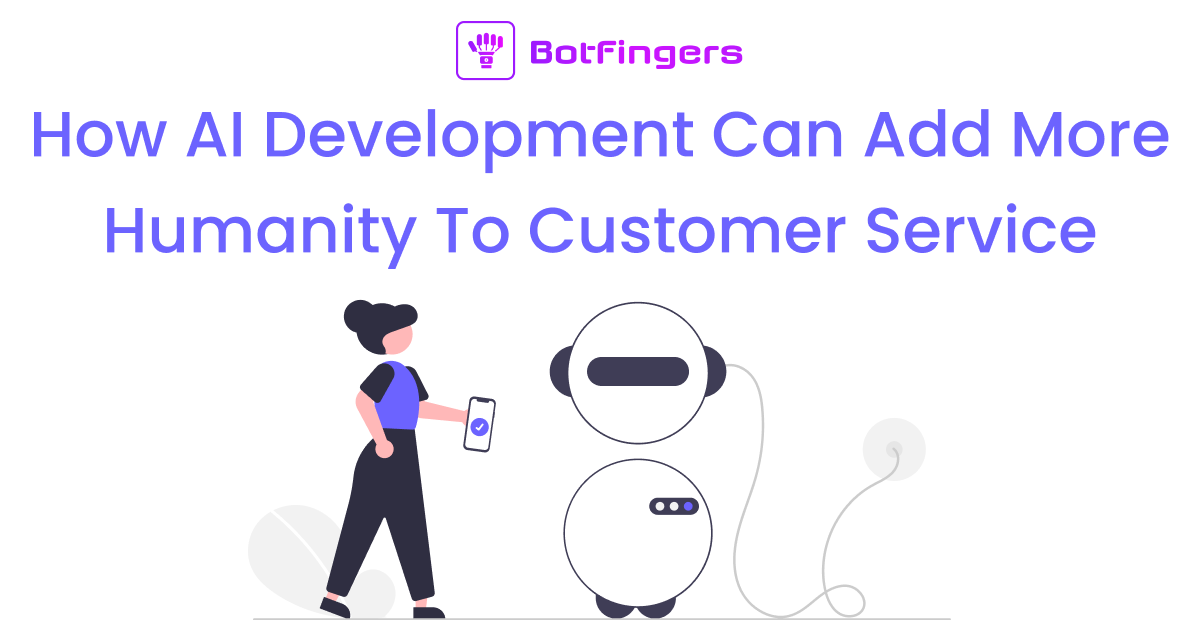Customer service is a critical aspect of any business, and it can make or break the relationship between a customer and a company. In today’s fast-paced world, customers expect quick and efficient support, and businesses must meet these expectations to stay competitive. Artificial intelligence (AI) has the potential to revolutionize customer service by providing personalized and effective solutions to customers’ problems. In this blog, we will discuss how AI development can add more humanity to customer service.
Understanding AI Development
AI development involves creating intelligent machines that can perform tasks that usually require human intervention. Machine learning, natural language processing, and deep learning are some of the techniques used to develop AI. Machine learning algorithms enable machines to learn from data and make predictions, while natural language processing enables machines to understand and respond to human language. Deep learning algorithms, on the other hand, enable machines to learn from data in a hierarchical manner.
AI Development in Customer Service
AI has already begun to impact customer service, and businesses are using AI-powered chatbots to provide customers with instant support. Chatbots are software applications that can conduct conversations with humans through messaging platforms or voice assistants. Chatbots can answer common customer queries, provide product recommendations, and even process orders.
AI-powered chatbots are available 24/7 and can handle multiple queries simultaneously, thereby reducing the response time for customers. Chatbots can also collect data from customers and use this data to personalize the customer experience. For example, a chatbot can recommend products based on a customer’s purchase history or browsing behavior.
AI can also assist human customer service agents in resolving complex issues. AI-powered tools can analyze customer data and provide insights that can help agents understand the customer’s problem better. For example, if a customer has made several purchases in the past and suddenly stops, an AI-powered tool can flag this behavior and provide agents with insights into why the customer stopped purchasing.
AI can also analyze customer feedback and sentiment analysis to identify areas where businesses need to improve. Sentiment analysis involves analyzing customer feedback and classifying it as positive, negative, or neutral. AI-powered sentiment analysis tools can analyze large volumes of customer feedback and identify patterns that businesses can use to improve their products or services.
How AI Development Can Add More Humanity to Customer Service
One of the main concerns with AI-powered customer service is that it can feel impersonal. Customers may feel like they are talking to a machine and not a human, which can lead to frustration and dissatisfaction. However, AI development can add more humanity to customer service in several ways.
- Personalization
One of the main advantages of AI in customer service is personalization. AI-powered chatbots can collect data from customers and use this data to personalize the customer experience. For example, a chatbot can recommend products based on a customer’s purchase history or browsing behavior. Personalization can make customers feel valued and appreciated, which can increase customer loyalty.
- Empathy
Empathy is an essential aspect of customer service, and it can be challenging for machines to replicate. However, AI development can enable machines to display empathy in several ways. For example, AI-powered chatbots can use natural language processing to understand the customer’s emotions and respond appropriately. If a customer expresses frustration, a chatbot can respond with a message like, “I’m sorry to hear that you’re having trouble. Let me see if I can help.”
- Collaboration
Another way that AI can add more humanity to customer service is by collaborating with human customer service agents. AI-powered tools can analyze customer data and provide insights that can help agents understand the customer’s problem better. For example, if a customer has made several purchases in the past and suddenly stops, an AI-powered tool can flag this behavior and provide agents with insights into why the customer stopped purchasing. This collaboration can enable agents to provide more personalized solutions to customers, which can lead to increased satisfaction and loyalty.
- Seamless Experience
Another way that AI development can add more humanity to customer service is by providing a seamless experience for customers. Customers expect quick and efficient support, and AI-powered chatbots can provide instant support 24/7. Chatbots can also handle multiple queries simultaneously, reducing the response time for customers. This quick and efficient support can lead to increased customer satisfaction.
- Increased Efficiency
AI development can also increase efficiency in customer service. AI-powered tools can automate repetitive tasks, enabling human customer service agents to focus on more complex issues that require human intervention. This can lead to increased productivity and reduced costs for businesses.
- Real-Time Assistance
AI-powered chatbots can provide real-time assistance to customers, enabling them to resolve their queries quickly. Chatbots can also provide proactive support by alerting customers to issues before they become problems. For example, if a customer’s order is delayed, a chatbot can send a message to the customer informing them of the delay and providing an estimated delivery time.
Conclusion
AI development has the potential to revolutionize customer service by providing personalized and effective solutions to customers’ problems. AI-powered chatbots can provide instant support 24/7, handle multiple queries simultaneously, and personalize the customer experience. AI-powered tools can also assist human customer service agents in resolving complex issues and provide insights that can help businesses improve their products or services. AI development can add more humanity to customer service by providing empathy, collaboration, a seamless experience, increased efficiency, and real-time assistance to customers. As AI continues to evolve, it will be interesting to see how it will shape the future of customer service.

